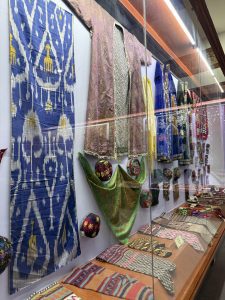September 2024 | BIPS Travel Grant
A study of Ahmad Dānish’s legacy within the context of late 19th-century Persian-speaking intellectual trends
Summary of topic:
My doctoral dissertation explores the place of Ahmad Dānish, a 19th-century Bukharan intellectual, within the context of wider Persian-speaking intellectual trends. Dānish was born in Bukhara in 1827 and started working at the court of the Bukharan emirs from an early age. He took part in three embassies sent by the Bukharan Emirate to the Russian Empire: in 1856, 1869-1870 and 1873-1874. Eventually Dānish produced his most famous work, Navādir al-vaqāyi‘ [The Rarest of Events], which consists of various treatises that talk about the rules of married life, the issue of women’s rights in the Bukharan Emirate in the end of the 19th century and the importance of education for both men and women, as well as about Dānish’s trips to the Russian Empire. During the Soviet period (and partially even after it) scholarship on Dānish tended to represent him as a pre-Revolutionary ‘enlightener’ whose progressive ideas were formed as the result of his trips to Saint Petersburg and encounter with Russian culture. My research aims to challenge this widely accepted view by contextualising Dānish’s thoughts within the wider Persian-speaking intellectual trends of Iran, Afghanistan and other parts of the Persian-speaking world in the 19th century.
Report:
As I am still in the process of finishing my doctoral dissertation, the results are preliminary. However, overall, it is evident that Dānish’s writings were deeply rooted in Persian literary and intellectual traditions. My research challenges the assumption that Central Asia was isolated in the 19th century and that intellectuals from there had no access to contemporary developments in Iran and other parts of the Persian-speaking world.
By working with previously unpublished documents and autographs stored at various archives (in Uzbekistan, Russia and Tajikistan), my research aims to provide a realistic image of what was actually happening in the intellectual history of Central Asia during the period of the Russian conquest and to recast our understanding of the past. I also aim to challenge the view of the region as ‘backward’ (this view was cultivated by Russian imperial and Soviet scholars who argued that Russian conquest was beneficial for the region). By using the autographs of Dānish’s works, my dissertation demonstrates that he never expressed any desire to imitate Russian customs or way of life, contrary to what various scholars claimed – in fact, all his thoughts and ideas were deeply grounded in Persian intellectual traditions, as in Iran, for instance, the years preceding the Constitutional Revolution of 1905-1911 also witnessed certain rise in protests and demands for social and political change.
Another important aspect of my current research is that I focus on a less studied part of the Persian-speaking world. I argue that up until the change of alphabet imposed by the Soviet government on Tajik Persian language in the 20th century, the Persian-speaking space was relatively homogeneous linguistically, culturally and intellectually.
During my trip I was planning to work with four remaining manuscripts of Dānish’s Navādir al-vaqāyi‘, as outlined in my proposed scheme of research. I managed to find three of them in Dushanbe, as the fourth one is currently missing.
As planned originally, reading the remaining manuscripts of Dānish’s works allowed me to support my argument that Dānish and his intellectual legacy should be studied as an integral part of the Persian-speaking world, and that his progressive (in the context of Bukhara of the 19th century) ideas were not formed as the result of his trips to the Russian Empire (as opposed to what was argued by some previous scholarship).
In addition, this trip to Dushanbe ensured that my interpretation of Dānish’s intellectual legacy is firmly based on all the currently available primary evidence (rather than on the printed editions of his works, which could have been edited during the Soviet period).
Kamila Akhmedjanova is a PhD student at University of Oxford.
